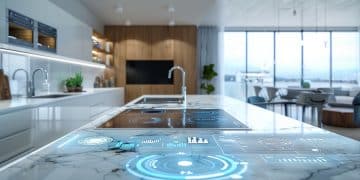Smart home systems for energy efficiency in 2025

Advertisement
Smart home systems for energy efficiency in 2025 will feature increased automation, enhanced integration, and sustainability, transforming energy management and significantly reducing energy costs for homeowners.
Smart home systems for energy efficiency in 2025 are set to transform our daily lives. Have you ever wondered how these innovations could cut your energy bills and make life easier? Let’s dive into what makes them so impactful.
Understanding smart home systems
Understanding smart home systems is essential in today’s tech-driven world. These systems connect various devices in your home to improve efficiency and convenience. By using smart technology, homeowners can adjust things like lighting, heating, and security remotely, leading to significant energy savings and enhanced comfort.
What are Smart Home Systems?
In simple terms, smart home systems allow multiple devices to communicate with each other. This interconnectedness makes it easier to manage your household tasks and monitor your energy usage. For example, smart thermostats learn your preferences and adjust temperatures according to your schedule, making your energy use more efficient.
Advertisement
Benefits of Smart Home Technology
Adopting smart home systems comes with numerous advantages:
- Increased energy efficiency through intelligent control.
- Enhanced security features, such as surveillance cameras and smart locks.
- Improved convenience with voice-activated assistants like Alexa or Google Assistant.
- Remote monitoring and control of your home environment.
The integration of these systems can help you save on energy bills while providing a more comfortable living space.
Another exciting aspect of smart home technology is its ability to adapt to your lifestyle. For instance, with smart lighting, you can program your lights to turn on or off based on your schedule. This reduces waste and enhances your home’s efficiency. Additionally, energy monitoring devices alert you to peak usage times, helping you make informed decisions about your energy consumption.
Advertisement
As smart home systems continue to evolve, their capabilities will expand. New technologies are emerging constantly, making integration easier and more affordable. Homeowners will soon be able to enjoy sophisticated features that were once considered luxurious or out of reach.
Key technologies driving energy efficiency
Key technologies are transforming the way we approach energy efficiency in smart homes. These advancements are not only reducing energy consumption but also enhancing the overall convenience of modern living. Understanding these technologies helps homeowners make informed decisions about their energy use.
Smart Thermostats
Smart thermostats are among the most popular tools in energy-efficient homes. They learn your schedule, adjusting temperatures automatically based on your presence. This means you are not wasting energy when no one is home.
Energy Monitoring Systems
Next are energy monitoring systems, which provide real-time data about your energy usage. By identifying patterns, these systems help you understand when and where you consume the most energy. This can lead to better habits and significant savings.
- Identify peak usage times.
- Set energy-saving alerts.
- Monitor usage across multiple devices.
Furthermore, integrating these technologies allows for adjustments based on real-time feedback. Homeowners can engage more proactively with their energy consumption, leading to informed choices that foster sustainability.
LED lighting is another effective technology for enhancing energy efficiency. Compared to traditional bulbs, LED lights use a fraction of the energy and last much longer. Simple switches to LED can drastically reduce energy bills and enhance lighting quality.
In addition, solar energy systems are becoming increasingly accessible. Installing solar panels can generate clean energy for your home, significantly decreasing reliance on conventional electricity. Many homeowners find peace of mind knowing they can harness the power of the sun, both for environmental reasons and cost savings.
As these key technologies evolve, the potential for improved energy efficiency will only grow. Continuous advancements promise smarter, more interconnected devices that enhance the way we live and reduce environmental impact.
Benefits of smart home integration

The benefits of smart home integration are significant and far-reaching. By linking different devices and systems, homeowners can enhance their living environments while improving energy efficiency. These technologies offer easy control and automation that simplify daily tasks and save money.
Convenience and Comfort
Smart home integration brings unparalleled convenience to everyday life. Imagine controlling your lights, thermostat, and security system from one app on your phone. This means you can adjust your home’s temperature before arriving home or ensure the lights are off when you leave.
Enhanced Security
Another benefit is enhanced security. With smart locks and surveillance cameras, you can monitor your home from anywhere. These systems can send alerts to your smartphone when they detect unusual activity, giving you peace of mind.
- Real-time notifications for security events.
- Remote access to monitor and control security devices.
- Integration with emergency services for faster response times.
Furthermore, integrating smart home technology helps save money. Smart thermostats can learn your habits and adjust settings automatically, lowering energy bills. Moreover, some devices can identify energy waste and suggest changes to improve efficiency.
By using smart home integration, you can achieve a more sustainable lifestyle. Devices can communicate and work together to optimize energy usage, which benefits not just your wallet but also the environment. As these systems evolve, they will become even more efficient and user-friendly.
Additionally, smart home integration makes life more enjoyable. Automated systems can streamline routines like cooking, cleaning, and entertainment, allowing you more time to relax or connect with loved ones.
Challenges and solutions for adoption
Adopting smart home systems presents various challenges that homeowners must consider. While technology offers great benefits, the transition can sometimes be overwhelming. Understanding these challenges helps individuals make informed choices about integrating smart technology into their homes.
Complexity of Installation
One of the main challenges is the complexity of installation. Depending on the system, installing smart devices can be tricky. Some devices require specific setups that might need professional help. Homeowners may hesitate to invest time and money in installations that seem daunting.
Compatibility Issues
Another concern is compatibility among devices. Not all smart devices work seamlessly together. Homeowners often find themselves dealing with multiple apps and platforms, leading to frustration. To overcome this, individuals should research and invest in devices that can communicate effectively.
- Look for devices with open protocols for better integration.
- Choose products from reputable brands known for compatibility.
- Read reviews and ask for recommendations from other users.
Security is also a significant issue. As homes become more connected, the risk of cyber threats increases. Smart devices can be vulnerable to hacking if not properly secured. Homeowners should follow basic security measures, such as using strong passwords and updating software regularly.
Despite these challenges, solutions are readily available. Many manufacturers provide user-friendly installation guides and customer support to assist new users. Additionally, homeowners can consider hiring professionals to set up more complex systems.
Another effective solution is to start small. Begin with a single device or system, and gradually expand as comfort with the technology grows. By taking gradual steps, homeowners can enjoy the benefits of smart home systems without feeling overwhelmed.
Future trends in smart home energy management
Future trends in smart home energy management promise to change the way homeowners interact with their energy systems. As technology advances, new solutions will emerge to optimize efficiency and enhance user experience. Understanding these trends helps homeowners prepare for a more energy-conscious future.
Increased Automation
One of the most significant trends is increased automation. Smart home systems will become even smarter by using artificial intelligence. For example, these systems can learn your habits and adjust energy settings automatically. This will lead to lower energy usage without requiring constant manual adjustments.
Enhanced Integration
Another trend is enhanced integration across devices. Smart appliances, lighting, and heating systems will communicate seamlessly to create a unified home environment. This means energy management systems can optimize usage in real time, improving efficiency significantly.
- Improved user interfaces for easy control and monitoring.
- Compatibility with renewable energy sources like solar panels.
- Integration with local energy grids for better energy distribution.
Moreover, energy management systems will prioritize sustainability. As more homeowners become eco-conscious, smart technologies will support the use of renewable energy. Devices will be designed to maximize energy efficiency while minimizing environmental impact.
Cost savings will continue to drive innovation as well. Companies will focus on developing affordable smart home solutions that provide significant returns on investment through energy savings. Homeowners will be able to reduce their energy bills while enjoying the latest technologies.
Furthermore, advancements in battery storage technology will enhance energy management in homes. Homeowners will store excess energy from renewable sources, using it during peak hours. This will provide greater energy independence and reduce reliance on traditional power sources.
In conclusion, the future of smart home systems is bright and filled with opportunities. As technology advances, homeowners can expect increased automation, enhanced integration, and greater sustainability. Adopting these systems will lead to improved energy efficiency, greater convenience, and cost savings. The challenges of installation and compatibility can be managed with proper planning and gradual integration. By embracing these trends now, individuals can prepare for a smarter, more efficient home that enhances their quality of life.
FAQ – Frequently Asked Questions about Smart Home Energy Management
What are the main benefits of smart home systems?
Smart home systems offer increased convenience, energy savings, enhanced security, and improved sustainability.
How can smart home technology save me money?
By optimizing energy use and reducing unnecessary consumption, smart home technology can significantly lower your energy bills.
What challenges might I face when adopting smart home systems?
Common challenges include installation complexity, compatibility issues among devices, and concerns about security.
What future trends should I be aware of in smart home technology?
Future trends include increased automation, enhanced device integration, and a focus on renewable energy and sustainability.





